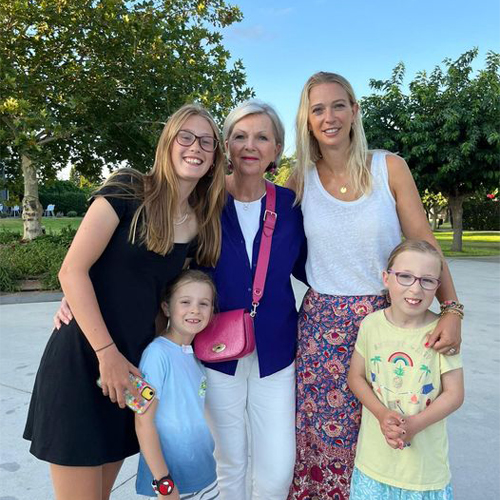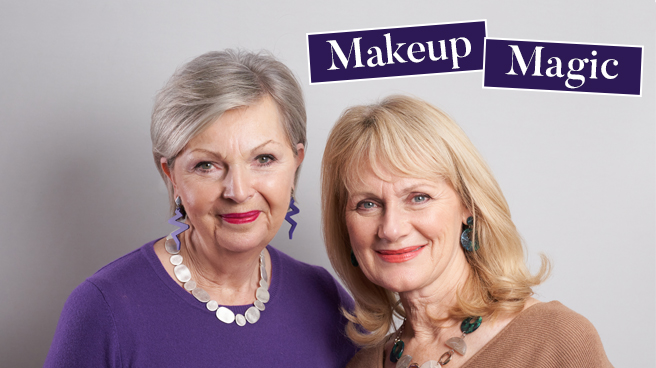
For the past three months I have been living under the same roof as my two grandsons, Patrick and Rory. I would normally see them every Sunday evening for a family roast meal, but the building work I am having done on my home has facilitated daily contact…
Patrick (14) is away at school during the week, so it’s Rory with whom I have spent most time. It’s been quite a novel experience for me as I am most familiar with girls, but I have been called upon to do a lot of ‘baby-sitting’, especially in the hectic run up to Christmas and have experienced considerable pleasure in being around a delightful twelve year old boy and a few of his friends who come for supper after school and sometimes for sleepovers.
When I was twelve years old, I had only one surviving grandparent, whilst Rory has all of his still going strong, a trend which is replicated worldwide.
In 1960 there were half a billion grandparents across the globe, now there are 1.5 billion and this is set to rise to 2.1 billion by 2050, which is 22% of the total worldwide population.These huge demographic shifts have profound consequences because, you may be unsurprised to learn, evidence shows that children do better when the family receives practical help from grandparents, which in effect, very often means grandmothers. Why? Because grandmothers all over the world often play a distinctive role in looking after their children’s children. This is the explanation that Rudi Westendorp, Professor of Old Age Medicine at the University of Copenhagen, has (somewhat reluctantly) come up with for our long survival after the menopause in his book “Growing Older without Feeling Old’.
I actually met Rudi Westendorp when we were both speakers at a conference in Dublin about living fulfilled, fit and healthy lives beyond retirement. You may be pleased to hear that I took him to task for his bemusement in the book that so many women now survive to very old age, when, from a purely evolutionary perspective, their ‘dead ovaries’ should render them redundant. I particularly took him to task for saying that, despite the dead ovaries, we postmenopausal women have both bodies and minds “which may well still be perfectly fine.” (my italics). Reassuring and welcome news to all of us old biddies, I’m sure you’ll agree!
Not finding any historical evidence for why so many women, infertile from 50 onwards, survive so much longer than fertile older men, Westendorp accepts that benefits must flow from the contribution that grandmothers make to the survival of more of their grandchildren in poorer countries and he also accepts that In more affluent places, grandmothers may provide much needed child care so that young mums can more easily move into paid work, thus increasing the income and living standards for the whole family. In fact, according to an article in The Economist called ‘Age of the Grandma’, there is now much data to show that having plentiful grandparents is a force for good in many societies.
Senegal
In Senegal, large families remain the norm in a country mostly made up of subsistence farmers, so the ratio of grandparents to grandchildren is low. Grandparents there are a valued source of traditional stories, beliefs, songs and a sense of history and also provide a valuable extra pair of hands. The presence in the family of a maternal grandmother has been shown to significantly increase the chance of her grandchildren living beyond the age of two, most likely because she is there to help to watch over and nurture all those little ones.
Mexico
Birth Rates in Mexico have declined rapidly from an average of 7 children per family in 1960 to just two in 2020. Mexico’s ratio of grandparents to grandchildren is three times higher than in Senegal. Many grandmothers live with their offspring and contribute to the household by being home to look after their grandchildren whilst their daughters are out at work. Childcare in Mexico is patchy and expensive, so it’s no surprise that a recent study showed that, with the death of her mother, a woman’s earnings can drop by as much as 53%.
China
Until very recently China has had a ‘one child’ policy which has led to 4-2-1 households/families with 4 grandparents, 2 parents and just a single child. Nurseries are expensive and distrusted, so the availability of so many ‘elders’ means that 62% of mothers are able to work outside the home. However there may be disadvantages to being doted on by four grandparents with the result that the single adored grandchild may be less independent and considerably more spoilt or indulged.
More Affluent Economies
In other parts of the world, childcare may be more readily available and relatively cheap, as it is in most Scandinavian countries, meaning that grandparents are rarely needed for help with the children whilst their mother is at work. Generous maternity and paternity leave also means that very young children are most likely to be looked after by one or other parent rather than their grandparents. However in the UK, where nurseries are very costly, over 5 million out of 14 million grandparents provide regular childcare, saving their families an eye watering £22.5bn in annual childcare costs. One downside of this is that reliance on grandparents may lead to lower labour mobility as the older generation tends to prefer to stay put rather than follow where their children’s work takes them.
And what of the benefits to grandparents?
There is no doubt that grandchildren can be a source of considerable pride and joy for many. A survey in the USA showed that 50% of very young children had weekly contact with their grandparents, whilst 35% of primary age and 20% of teenagers saw them every week. This level of inclusivity clearly has a favourable impact on any depression, isolation or loneliness that the older generation may experience. However, looking after young children can also be exhausting and frustrating and you may find some of their behaviours objectionable. It may also be fine when you are still in your sixties but less so as you enter your seventies and eighties. And what of your own needs and desires for an easier life and an opportunity to travel or pursue new interests?

I first became a grandmother at the age of 60. As both of my children live nearby me in south west London, I loved being available to give my daughters a hand as their young babies arrived. I gave regular informal child care to Patrick and Rory and then had a more formal arrangement when I looked after Freya twice a week whilst her mum went back to a demanding job. Then in 2012, when I was 64, my fourth grandchild, India was born. As many of you know, she was born with many physical and mental challenges and needed 10 months of care, most of it in PICU. Her sister, Freya was just over 3 years old at the time and I was more than happy to step in to look after her whilst her mum was supporting India in hospital. Then when Suzy needed a break and wanted time with Freya, I was also happy to step into her shoes at India’s bedside. It was a demanding, often traumatic and challenging time, but I felt strongly that as the grandmother of a very sick grandchild I needed to step up to the plate. It also felt right because I was available to play such a vital role.
Now with Look Fabulous Forever taking up my time and energy I have all of the joy of my five grandchildren with none of the responsibility, which is, honestly, how I like it. My fifth grandchild, Matilda, was born six years ago and I started to realise that we barely knew each other, so much so that she adamantly refused to believe that I am Suzy’s mother! I’ve tried to make amends by taking her on regular trips to our local childrens’ theatre which we both enjoy enormously and it has definitely helped me to feel a deeper connection to a child whose behaviour can be challenging at times, but who is as good as gold when she is with me.
I have been heartened by the worldwide statistics that show that children now benefit from a close relationship with more of their grandparents than ever before. My hope is that the importance of grandparents will begin to be acknowledged and accorded greater value, not least for their (completely taken-for-granted) contribution to the economy with all that free childcare. I would also like to see our status enshrined in a law which would confer rights to contact with our grandchildren if there is a divorce in the family and that relationship is blocked by one or other parent. Personally I love having all of my brood in my life and I hope that they like spending time with me. Even Matilda is finally coming round to the notion that I really am her Grandma, and not just some random old person who drops round every now and again!
Tricia x
Watch Our Latest Video...
How To Take The Perfect Selfie
Sally tells you her Top Tips for taking the perfect Selfie. From the best lighting, to a decluttered background, discover the top tips to capture the best version of yourself in a few easy steps...
Upcoming Events:
Monday 6th February

Makeup Magic
Join us for a Makeup Magic with LFF Founder Tricia Cusden and our resident MUA Sally!
Day: Monday 6th February 2023
Time: 11:00 am
Link: https://us02web.zoom.us/j/89638448378
Meeting ID (if needed): 896 3844 8378
Friday 17th February
Monday 5th December

Film Club: King Richard
Available on Now TV
Watch the film beforehand and join us for a group discussion!
Day: Friday 17th February 2023
Time: 4pm
Link: https://us02web.zoom.us/j/86109288705?pwd=TUgzQW5IK0VnUGI2MGdtb0FQN3hxZz09
Meeting ID (if needed): 861 0928 8705
Password (if needed): LOOKFAB














